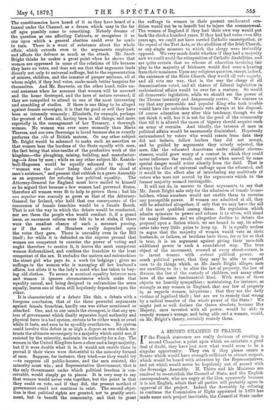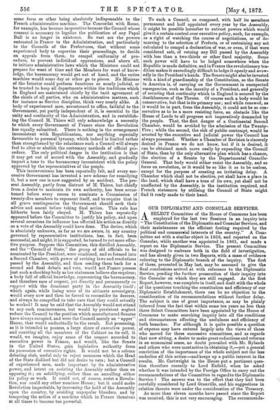A SECOND CHAMBER IN FRANCE.
IT the French statesmen are really desirous of creating a second Chamber, a point upon which we entertain a good deal of doubt, they have just now what would seem to be a singular opportunity. They can if they please create a Senate which would have strength sufficient to attract respect, which would be heard with attention by the Representatives, and yet which would never be hopelessly out of accord with the Sovereign Assembly. M. Thiers and his Ministers are resolved to re-establish the Council of State, and the English correspondents, who are angry at the idea, apparently because it is not English, admit that all parties will probably agree in approval of the project. Indeed the Assembly by refusing to continue the Commission of Eight appointed in 1870 has made some such project inevitable, the Council of State under
some form or other being absolutely indispensable to the French administrative machine. The Concordat with Rome, for example, has become inoperative because the Council whose consent is necessary to legalize the publication of any Papal Bull is no longer in existence. So vast are the powers entrusted in France to the Administration, and particularly to the Councils of the Prefectures, that without some experienced body to supervise their proceedings, to decide on appeals from them, to compel uniformity of pro- cedure, to prevent individual oppressions, and above all, to initiate administrative laws which the Ministers could not prepare for want of time and the Members for want of know- ledge, the bureaucracy would get out of hand, and the entire machine would some day or other go to pieces. No Minister of the Interior could perform functions so nearly judicial, or be trusted to keep all departments within the traditions which in England are maintained chiefly by the tacit agreement of the chiefs of all parties, who on administrative matters, such for instance as Service discipline, think very nearly alike. A body of experienced men, accustomed to office, faithful to the Government, yet partly independent of it, is essential to the unity and continuity of the Administration, and in restablish- ing the Council M. Thiers will only acknowledge a necessity to which every Government of France since the Revolution has equally submitted. There is nothing in the arrangement inconsistent with Republicanism, nor anything especially favourable to personal tyranny, which indeed is limited rather than strengthened by the reluctance such a Council will always feel to alter or abolish the customary methods of official pro- cedure. The only political danger in the institution is that it may get out of accord with the Assembly, and gradually impart a tone to the bureaucracy inconsistent with the policy approved by the representatives of the people.
This inconvenience has been repeatedly felt, and every suc- cessive Government has invented a new scheme for remedying it, but a new one is now suggested by an accident. The pre- sent Assembly, partly from distrust of M. Thiers, but chiefly from a desire to maintain its own authority, has been accus- tomed before every recess to nominate a Commission of twenty-five members to represent itself, and to require that in all grave contingencies the Government should seek their advice and assent before taking final action. This rule has hitherto been fairly obeyed. M. Thiers has repeatedly appeared before the Committee to justify his policy, and upon several occasions its influence has affected his action as directly as a vote of the Assembly could have done. The device, which is absolutely unknown, as far as we are aware, in any country governed by representative institutions, has, in fact, been successful, and might, it is suggested, be turned to yet more effec- tive purpose. Suppose this Committee, this distilled Assembly, and the "Council of State," the group of old officials to be nominated by the President, were combined, and so formed into a Second Chamber, with power of revising laws and resolutions passed by the Assembly, and then sending them back for a second and final debate and vote, would not France possess just such a checking body as her statesmen believe she requires; a body full of official knowledge, representing the bureaucracy, and therefore sure of respect, yet directly and permanently en . rapport with the dominant party in the Assembly itself ; 'which again, while losing none of its ultimate sovereignty, would every now and then be forced to reconsider its decrees, -and always be compelled to take care that they could actually be worked? It may be said that the Assembly would not attend to any such remonstrances, but would by persistent neglect reduce the Council to the position which manufactured Senates have always occupied, and were the Council merely an " upper" House, that would undoubtedly be the result. But possessing, as it is intended to possess, a large share of executive power, and counting all the members of the Cabinet on its roll, it would, we imagine, enjoy some of the respect accorded to executive power in France, and would, like the Senate in the United States, gain legislative authority from its possession of executive rights. It would not be a solemn debating club, useful only to reject measures which the Head of the State disliked but did not desire to veto ; but a Council of experienced men, made important by its administrative power, and intent on assisting the Assembly rather than on opposing it ; on solidifying, rather than on annulling either its policy or work. It could not, of course, resist a Revolu- tion, nor could any other nominee House ; but it could make Revolution improbable, by increasing the hold of the Assembly upon the country, by avoiding unpopular blunders, and by tempering the action of a machine which in France threatens at all times to become too powerful. To such a Council, so composed, with half its members permanent and half appointed every year by the Assembly, it might be possible hereafter to entrust powers which would give it a certain control over executive policy, such, for example, as a right of watching the course of negotiations, or of de- murring to the selection of Prefects, or of restraining any act calculated to compel a declaration of war, or even, if that were considered safe, of vetoing any Bill passed by the Assembly with less than a two-thirds or other fixed majority. Some such power will have to be lodged somewhere when the Republic is made definitive, and in France the revolutionary tra- dition makes it exceedingly difficult to lodge it openly and avow- edly in the President's hands. The Senate might also be invested with a kind of guardianship of the Constitution, as the Senate in America is, of carrying on the Government in unexpected emergencies, such as the insanity of a President, and generally of securing that continuity which in England is secured by the deathlessness of the Throne. Of course such a body would be conservative, but that is its primary use ; and while renewed, as it would be in part, from the Assembly, it could not be so con- servative as to be a mere resisting force, an obstacle like the House of Lords to all progress not imperatively demanded by the people. That, the first danger of a Continental Second Chamber, would be avoided by the admission of the Twenty- Five ; while the second, the risk of public contempt, would be averted by the executive and judicial power the Council has always possessed. Whether a Chamber of Revision is sincerely desired in France we do not know, but if it is desired, it can be obtained much more easily by expanding the Council of State, than by the only alternative plan which has a chance, the election of a Senate by the Departmental Councils- General. That body would either resist the Assembly, and so force on revolution, or it would be so like it as to be useless, except for the purpose of creating an irritating delay. A Chamber which shall not be elective, yet shall have a place in the land, which shall have a tone of its own, yet shall not be unaffected by the Assembly, is the institution required, and French statesmen by utilising the Council of State might find it ready made to their hand.



































 Previous page
Previous page